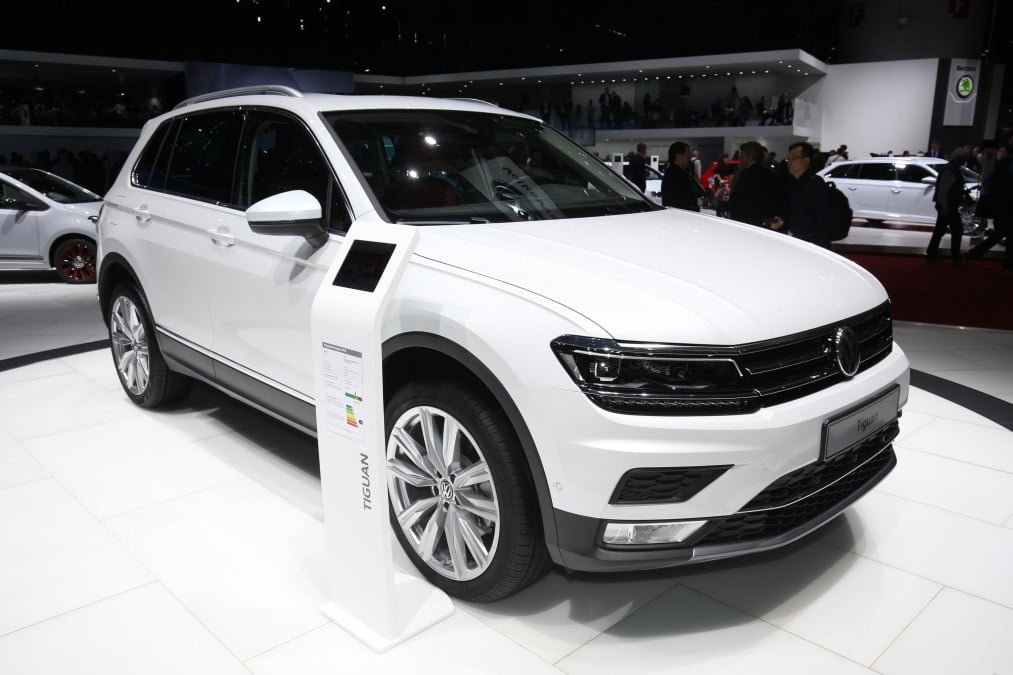

Volkswagen’s second generation Tiguan has built on the strengths of the first – it’s a still high-quality, versatile all-rounder that bridges the gap between hugely popular and ubiquitous small SUVs such as the Nissan Qashqai and posher offerings along the lines of the Audi Q3.
This new model has been positioned closer to its premium rivals, however, with an upmarket, premium design and performance variant and a more spacious interior.
It’s offered with front-wheel drive as standard, but all-wheel drive with Volkswagen’s 4MOTION system is available further up the range. There are also a large number of petrol and diesel engines to choose from, plus a wide array of trim levels, so potential buyers have plenty of options to chew over.
Here’s an in-depth look at how it stacks up.
Contents
Design
The new generation is longer by 2.3ins, so there’s a bit of added legroom for those in the back. However, headroom is 1.3ins shorter, a change feeding into the new Tiguan’s design traits.
Volkswagen is trying to convey a more premium look with its new crossover,Auto Express says, creating a chunkier-looking affair with plenty of sharp lines and creases. When equipped with the R-Line bodykit, the bumpers gain muscular vents and details. Overall, it’s a modern package, which is vital in a design-led market segment.
The new version uses Volkswagen’s MQB platform, sharing it with the current Golf and Passat, which it most resembles. However, the Daily Telegraph says the Tiguan has a definite “whiff of the bigger Touareg”, the company’s larger SUV, but Volkswagen has nailed the design of the Tiguan sitting beneath it. It’s a “handsome purchase”, adds the paper.
Interior and practicality
If the exterior is inspired by the Passat, so, too, does the interior, says CarWow. While the design doesn’t boast the same amount of flair as you’ll find on some rivals, everything is neatly laid out and well made, with the high-quality plastics you’d expect in more premium offerings.
As standard, you’ll get air-conditioning and a touchscreen infotainment system, but not a sat nav – it’s a £725 extra, or you’ll have to step up to SE-Nav trim to get as part of the package.
One of the biggest interior options to consider, though, is the Active Info Display – a 12.3ins screen replacing the instrument binnacle. It’s perfect when mated to the sat nav, mounting the maps in huge detail right in front of the driver.
In terms of practicality, the new Tiguan is a five-seater and the rearmost pew can move backwards and forwards, prioritising passenger or boot space, depending on which you need.
As for the boot, it’s 520 litres with the rear seats in their normal position, but can grow to 615 litres if you push the rear row of seats forward. Regardless, it’s a bigger boot that you’ll find on rivals such as the Nissan Qashqai (430 litres) and Mazda CX-5 (503 litres). Folding the rear seats flat opens up a 1,655-litre space.
The boxy rear end of the Tiguan makes for a square-ish shape-loading bay, so it should be easy to get large items in and out.
The Tiguan is strictly a five-seater car for now, although that could change soon. A Tiguan XL is tipped to arrive early next year and could go on sale in the UK. Offered with a longer wheelbase and two extra seats in the boot, it’ll make one of the UK’s most popular crossovers even more versatile when it arrives.
Diesel engines
Diesel options are the most economical choices so will make sense for most buyers. What’s more, there are powerful choices if you don’t want to be down on performance.
Each version is a 2.0-litre four-cylinder, but with differing levels of power. The entry-level power unit has 113bhp tied to a manual gearbox. Volkswagen claims it can deliver 60mpg on a combined cycle and has its CO2 emissions pegged at 123g/km. The mid-range option gets 148bhp, although it’s not quite as efficient, with 58.9mpg claimed alongside slightly higher CO2 emissions of 125g/km.
The range-topping diesel engine makes for the most powerful Tiguan you can buy – a 2.0-litre bi-turbo with 237bhp, which can accelerate from 0-62mph in a hot hatch-rivalling 6.5secs before going on to a top speed of 142mph. It is much less efficient, though, with 44mpg targeted.
Petrol engines
Petrolheads have two choices. The 1.4-litre TFSI unit with 123bhp is the less powerful of the two and produces a claimed 46.3mpg plus CO2 emissions of 139g/km. A 2.0-litre TFSI sits above it with 178bhp, although the 38.2mpg figure and 170g/km emissions will make it the most expensive Tiguan to run.
Four-wheel drive
Basic versions of the Tiguan will be front-wheel drive, with four-wheel drive either optional or standard on cars higher up the ladder.
For the diesels, the mid-range 148bhp car can be fitted with a 4MOTION AWD system, as well as a DSG automatic gearbox at a cost, while the range-topping 2.0-litre BiTDi gets these as standard. It’s the same story with the petrol units – the 178bhp 2.0-litre TFSI will be four-wheel drive regardless of how you spec it.
Will we see a hybrid version?
A hybrid powertrain option could also arrive at some point. Volkswagen revealed a Tiguan GTE plug-in concept in Frankfurt last year, mating a 154bhp turbocharged 1.4-litre petrol engine to an electric motor for a power output of 215bhp.
Volkswagen claims it would be able to return 149mpg on a combined cycle, with as little as 42g/km CO2 emissions and an all-electric range of 30 miles. According to rumours, the group is still deliberating about introducing the plug-in at some stage. It would be a compelling option, being tax free and eligible for the government’s £4,500 grant.
Trim levels
The cheapest model – the Tiguan S – comes with 17ins alloy wheels as standard, as well as the eight-inch touchscreen, Bluetooth and air conditioning. There’s also a height-adjustable driver’s seat and the steering wheel is trimmed in leather.
Upping to the SE brings along some new tech, creature comforts and practical options. The infotainment system gets Volkswagen’s “App Connect”, featuring Apple CarPlay, Android Auto and Mirror Link connectivity. Rear passengers get folding picnic tables and there are storage spaces under the front two seats. Lastly come three-zone climate control and tinted rear windows.
SEL trim takes these additions and puts a cherry on top – 19ins alloy wheels and LED lights as standard, along with massaging front seats and ambient cabin lighting. A large, glass, panoramic roof is added, together with all-round parking sensors.
For buyers wanting their Tiguan to look as good as possible, only the range-topping R-Line trim will do. It gets the stronger, sculpted bodykit and rides on 20ins alloy wheels. Volkswagen’s instrument-replacing digital cockpit, the Active Info Display, is thrown in, too. An excellent addition.
Prices
Prices start from £22,510 for the Tiguan S fitted with the entry level 1.4 TSI petrol engine, a manual gearbox and front-wheel drive. Tiguan SE trim kicks off from £25,260 for the more powerful 148bhp version of the 1.4-litre engine, while SE NAV cars also using the 148bhp unit start at £25,985.
For £29,610, you can get the Tiguan SEL with the 148bhp diesel as standard, while the range-topping R-Line starts from £31,925 with the same engine.
The BiTDi version, with its powerful 237bhp engine and fast straight-line performance, is by far the most expensive option. Only available in R-Line trim, it starts from £38,000.
Every trim level has a large range of engine, gearbox and drivetrain options, so there’s plenty to mull over. Order books are open now.
Reviews
The Tiguan is fairly straightforward according to CarBuyer. It’s a small but practical SUV with a premium edge over rivals like the Nissan Qashqai.
Inside, the cabin may lack design flair but build quality is high. The overall touch and feel of surfaces and switches is “easily on par with the Audi Q3” – the benchmark car in this class when it comes to interior design.
Auto Express warns that you can buy better crossovers to drive, but the Tiguan remains very good at the essentials. “It’s an extremely well-rounded package lacking a bit of personality but ticking lots of boxes”.
The cabin is spacious with “acres of room for a growing family”. Again, the interior quality is commended, as is much of the on-board technology. The magazine recommends the car fitted with the 148bhp 2.0-litre TDi engine in SE Nav trim – you’ll get key extras like satellite navigation thrown in as standard.
CarWow says it “rides firmly like an Audi, but is never uncomfortable, and the light-but-direct steering makes it easy to manoeuvre in town and place confidently on the open road”.
The site recommends adding a little flair to the car’s bland but quality interior by opting for the Active Info Display. It’s a large 12.3ins screen that replaces the dials behind the steering wheel with digital instrument binnacles and a large, highly detailed sat nav display.
What Car? says that on the road the 148bhp 2.0-litre TDI serves up a fine blend of performance and fuel economy. The less powerful engine feels “a little short of puff”, however, and though the more powerful versions come with extra bite, they are priced higher and will cost more to run on a day-to-day basis.
It’s a comfortable car and “by small SUV standards the Tiguan rides very well indeed”, says the magazine. Again, the cabin is a little conservative, but the quality is good – “that means plenty of soft-touch plastics and controls that work with a reassuring precision”.
[source;the week]




